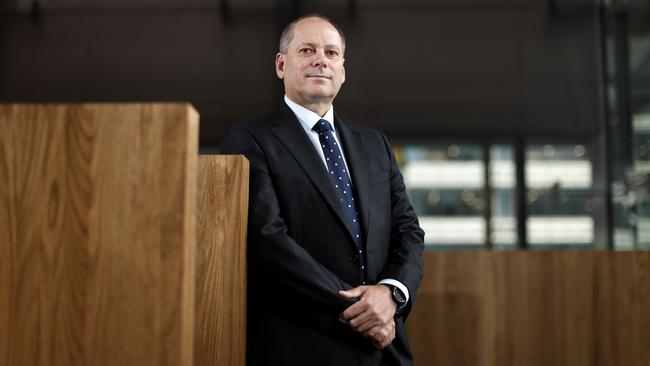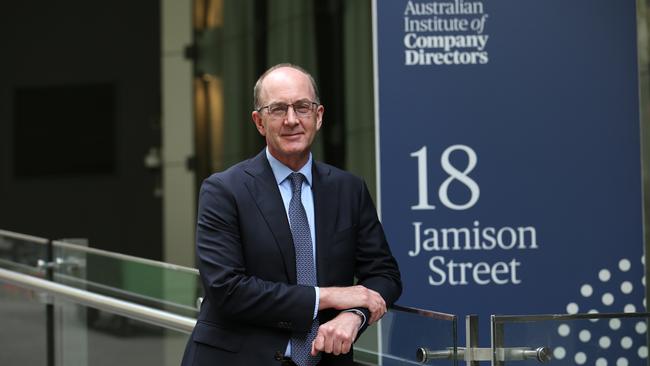
This from a bank which, through a series of risk failures and poor cost controls, has suffered a series of regulatory snafus.
In a boom market it has failed to match home loans at market rates and is attempting now to do so, chasing the high-flying magic Matt Comyn at CBA.
The big banks are all enjoying a bonanza with excess liquidity creating high housing demand and with official rates at record lows, and there is no pressure to halt falling deposit rates, which have helped keep net interest margins lower.
There comes a point when this bull market slows. New home loans sell at a return on equity of 35.8 per cent on Jefferies numbers, or more than three times the overall 10.2 per cent posted by Westpac and compared to existing home loans, which return 69 per cent.
King’s chairman, former ANZ boss John McFarlane, once said banks couldn’t walk and chew gum at the same time, but that is exactly what King will attempt to do and right now the market is giving him the benefit of the doubt.
Westpac’s stock price climbed more than 5 per cent on Monday after lagging rivals ANZ and NAB in the period after last October’s full-year profit announcements.
Westpac rose 43 per cent in the period up to last Friday against a 46 per cent rise for NAB and 57 per cent lift for ANZ.
While talking up the prospect of a capital return when APRA has sorted out its capital rules, the bank also wound back its targeted payout ratio to between 60 per cent and 65 per cent, from the previous range of 60-75 per cent.
This suggests a more cautious outlook than the bullish talk in the presentation.
King said a decision would be made this half on whether to proceed with a demerger of the New Zealand operations, which account for 12 per cent of lending and 15 per cent of earnings, which are meaningful contributions.
The bank overall has 21 per cent of Australian bank deposits and 22 per cent of mortgages, so it is a strong franchise, but net promoter scores for the St George brand are positive 1.9 per cent, while Westpac is negative 7.3 per cent.
While most banks have negative net promoter scores, the reality is that this means customers are likely to tell their friends to bank elsewhere.
King needs to make friends with these customers, which he plans to do with better service while at the same time cutting costs.
Technology helps and the bank, which now handles 42 per cent of transactions digitally, thinks by 2024 that will be more like 70 per cent.
That is cheaper and already the bank is cutting back on ATMs, which at 1352 are 39 per cent down on 2019 levels, call centre volumes are down 9 per cent, while branch numbers are down 8 per cent.
King is reluctant to put numbers on staff or branches for obvious reasons, but both will fall while head office numbers and office space are targeted to fall by 20 per cent.
He is confident the bank now has the right systems in place to both ensure risk settings are ahead of past year disasters, and financial crime staff numbers are also up.
From there it’s a question of focus and King is confident he has the systems in place.
AICD’s winning form
Director lobby group the AICD collected $5m in the year to September in JobKeeper payments, including $2.6m for the financial year ended June.
The group, which represents company directors and provides training programs, reported a slight loss of $1.9m for the year to June 30, but by all reports its courses are in hot demand this year post-COVID.
Last financial year it had a positive cash balance of $45m, down from $52m in the 2019 year, but the company clearly either deferred membership fees or faced a shortfall with revenue around the $74m mark against $85.5m in 2019.
The good news for its membership is Josh Frydenberg has more than delivered to the big end of town, with his latest concessions being proposals to extend protection to boards in financial trouble by allowing them to trade under a debtors in possession-like rule.
Under the proposal circulated on Monday, a company can enter into a scheme of arrangement supported by creditors and execute its recovery plan without needing to go into voluntary administration.
This means the board stays in control so long as 50 per cent of creditors by number or 75 per cent by value supports the recovery plan.

The advantage for company boards is they stay in control when the practical reality is when an administrator is appointed the board loses control and more often than not the company is sold.
This is what happened with Virgin last year.
The issue is whether shareholders and creditors get any benefits, given the board is as often as not the same mob who presided over the collapse.
Still, the Treasurer has delivered again for the big end of town, which has scored a series of significant power grabs during COVID, some of which are still operating even as the economic recovery is a reality.
The insolvency change represents a major victory, offering boards more protection and less constraints than pre-pandemic.
The AICD, which advocates on behalf of boards, has won just about every proposal put to government to support big company boards, which shows its boss Angus Armour has brilliantly applied the maxim of not wasting a good crisis.
He has also pocketed taxpayer support in the process.
The new insolvency rules will often need bank support, as with small businesses, which were originally granted the same safe-harbour support.
Thanks in part to the government debt binge, the feared mass collapse of small companies has yet to materialise and, if the economic good news continues, it may not ever happen.
Frydenberg also granted the AICD an extended right to hold virtual annual meetings, which while necessary during COVID is also a convenient way for boards to control meetings.
It gives the chair more control over who speaks when, which is more difficult in an open meeting.
The banks have won freedom from responsible lending laws.
Boards also won exemptions to continuous disclosure laws that were seen crucial to controlling class actions against companies.
The explosion of class actions have caused director liability insurance premiums to skyrocket.
Last week Frydenberg also floated more controls over proxy advisers, which is another long-running AICD campaign.
Big business supports deregulation until freedom is used against it, then it wants controls imposed.
The Treasurer has yet to explain why groups like the Australian Shareholders Association, which represents small shareholders, will be unfettered but proxy advisory firms that advise sophisticated investors will face more controls. Such inconsistency is of course swamped by Frydenberg’s extraordinary largesse to the big end of town under the cloak of the pandemic.








Westpac boss Peter King will attempt to do what few major banks have managed to do before, which is build market share from a negative base, growing profits, while also cutting costs over the next three years by 20 per cent.